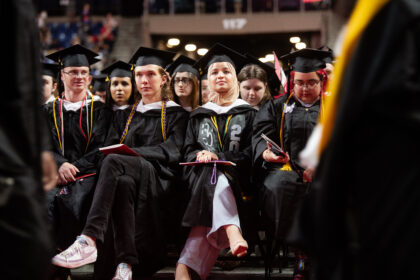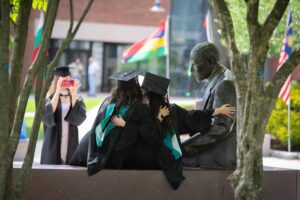‘Press for justice now, rather than justice delayed’

Clark University today awarded 1,376 degrees to the Class of 2024.

President David B. Fithian ’87 opened Clark’s 120th Commencement held at the DCU Center in downtown Worcester by asking everyone in the arena to give a full-throated, no-nonsense roar, so loud that anyone on campus two miles down the road could hear it.
“So much precedes this day and so much will, of course, follow it,” Fithian said. “But for now, for this day, smile upon yourself, applaud your achievements, reflect upon your growth, celebrate your friends and classmates, and, perhaps most importantly, bask in the love of those here with you and for you.”
Clark conferred 503 bachelor’s degrees, 847 master’s degrees, 26 doctoral degrees, and four honorary degrees. The graduates include 653 international students representing 39 countries. The Commencement ceremony was the first that Clark has held in the DCU Center to accommodate more guests including those with accessibility challenges.
Gary Labovich ’81, chair of the Board of Trustees, urged students to never take for granted an opportunity to present their best selves.
“While this may feel like an ending, it really is just the beginning. It’s the beginning of a great adventure — the rest of your life — one that only you can define and shape,” Labovich said. “I know it sounds kind of scary, but isn’t this what you have been waiting for?”


Geography Professor Rinku Roy Chowdhury read a commencement address from Dr. Robert D. Bullard, “the father of environmental justice” and the Distinguished Professor of Urban Planning and Environmental Policy at Texas Southern University. Bullard was unable to attend in person because of an illness. Bullard called himself a “proud Boomer” excited to work with Generations X, Y, and Z, to create necessary, transformative change.
“Every successful progressive social movement in the United States has had strong, fearless, and dedicated young people and students leading the way, pushing hard at the front and pressing for justice now, rather than justice delayed,” Bullard wrote.

Bullard grew up a child of the Jim Crow South, attending all-Black elementary, middle, and high schools and undergraduate college. When Bullard was kept out of his hometown public library in Elba, Alabama, his parents spent money buying extra books, encyclopedias, and magazines to supplement his education.
“Racial injustice kept me out of the public library, but the fight for civil rights and education justice allowed my 18 books to grace the shelves of that same library where I was banned decades earlier,” Bullard wrote.
Bullard cited a number of environmental justice milestones over the years, from a landmark 1979 lawsuit challenging the siting of solid waste facilities in Houston’s predominantly Black neighborhoods to the federal passage in 2023 of $60 billion “for getting resources into communities that historically have been left out and left behind.” He compared the quest for justice to an ongoing marathon relay.
“You run your 26.2 miles, and then the next generation begins their leg of the race,” he wrote. “I am driven by, and I am happy to be able to pass the baton to, the up-and-coming generations of environmental justice advocates who will continue with the same resilience that so many involved in the journey have already shown.”
In addition to Bullard, honorary degrees were conferred to Sean B. Carroll, Distinguished University Professor and Balo-Simon Chair of Biology at the University of Maryland, who has been called “the greatest science storyteller of our time”; Akiko Iwasaki, Sterling Professor of Immunobiology at the Yale University School of Medicine, who researches the mechanisms of immune defense against viruses at mucosal surfaces; and Michel Nischan, a four-time James Beard Award-winning chef and champion of the farm-to-table concept.
Laila El-Samra ’24 addressed her fellow undergraduates, members of what she called the “COVID” class. Pandemic upheaval caused most students to miss rites of passage like high school prom and graduation.
“Despite these challenges, we learned to find community whether in clubs, sports teams, or bonding over our struggle in Chem 101,” said El-Samra, a biochemistry major planning a career in dentistry. “Clark’s unique spirit prevailed, fostering resilience and solidarity.”
Adapting to a “new normal” together created strong connections in the Class of 2024 and emphasized the importance of embracing our shared humanity and giving voice to those who are unheard.
“I am reminded to be appreciative of all the opportunities I’ve had, and that I have a duty before God to not squander those opportunities, but to use them to leave an impact,” she said. “Our futures are deeply and innately intertwined with those who we share the earth with. And what we owe ourselves and others is compassion and empathy.
“We are the generation of changemakers, and as much as we may try to escape those five words, we are the ones who will ‘challenge convention’ and ‘change our world.’”
Graduate student speaker Gabe Spindel ’23, MBA ’24, exhorted his peers to shout out the name of a professor who made an impact on their lives. Inspiration transcends the classroom, said Spindel, a second-generation Clarkie preparing to launch his career in Washington, D.C.
“What makes the students at Clark so important to the education here is the profound diversity you can find walking through our halls. We encompass every corner of the earth,” he said. “Celebrating Diwali, Ganesh Chaturthi, and the Chinese New Year has enriched me in a way no classroom ever could.”
The ceremony was dotted with musical interludes by Marshalee Kehlhem, a gospel singer who performed “I Hope You Dance” and “My Wish.”
In closing the ceremony, Fithian urged the graduates to leave Clark willing to ask more, different, and better questions. Every opportunity to question, he said, is an opportunity to hear something you may not have heard before.
“My greatest hope for you is that you truly relish the never finished business of the project that is you, that you embrace the joy of discovery still ahead, and that you seize the opportunities to learn even more about the world, yourself, and what fulfills you,” he said.

























